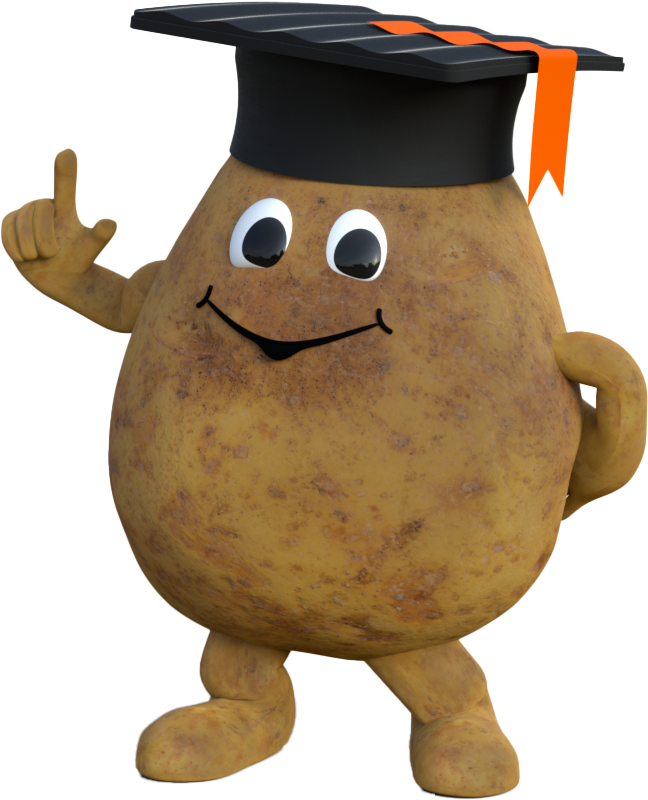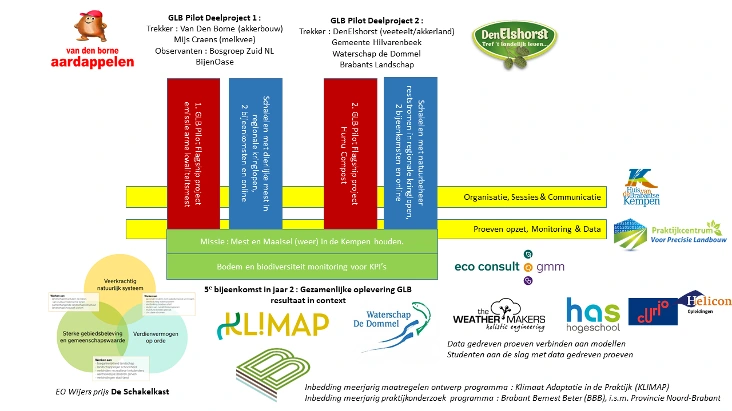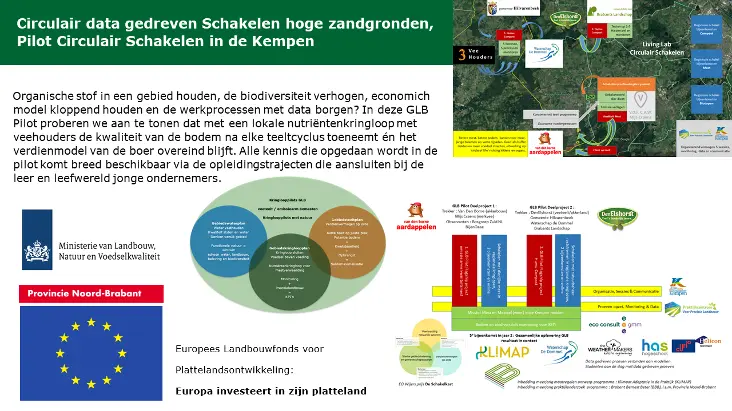ASSETS
News and meetings that make you smarter.
Closing cycles
Het Fieldlab Biodiversiteit richt zich op het sluiten van regionale groen-blauwe kringlopen, met als doel om bij te dragen aan de (inter)nationale uitdagingen op het gebied van bodem, water en emissie. Het uitvoeren van datagedreven proeven om kringlopen te sluiten tussen akkerbouwers en veetelers en het doen van proeven met reststromen van gemeenten, natuurbeheerders en waterschappen staat daarin centraal.
Project objective
Dit Fieldlab richt zich op het aanpakken van problemen met concrete pilots om zo het perspectief van de toekomstbestendige landbouw op hoge zandgronden te demonstreren. Concreet betreft het:
- Demonstrate that with a local nutrient cycle with livestock farmers, the quality of the soil increases after each crop cycle and the farmer's earning model remains intact.
- Demonstrate that in a local nutrient cycle with livestock and residual streams from the landscape, both soil quality and the farmer's income model can be improved.
- That the contribution of the activities on soil quality, soil life, biodiversity and reducing emissions is substantiated with validatable data.
- The information from activities and monitoring can be concretized into KPIs
- That all knowledge gained in the pilot will be widely available through the training programs and knowledge institution.
To achieve this, in this fieldlab we link up with water boards, nature managers, arable and livestock farmers.
Biodiversity above ground
One of the measures is to boost biodiversity. After all, crops are influenced by the weather and its environment. Good biodiversity can make soil and plants more resilient. It attracts more natural enemies against certain harmful insects. This can ultimately lead to less use of crop protection products.
For example, by using field and flower borders. In these, beneficial insects and natural enemies provide themselves with food and a hiding place. Other measures to boost biodiversity include:
- Bee Hotel
- Insect hedge
- Hawk poles
- Owl Boxes
Biodiversity from the ground up
Soil depletion and erosion is a major threat to arable, livestock, water and wildlife farmers alike. One of the CAP (Common Agricultural Policy) solutions is the use of high-quality natural manure and compost. Currently, too many nutrients and organic matter leave an agricultural area (by necessity). Grass clippings and other-green blue residual streams from municipalities and nature managers are often disposed of at high cost. Even manure from animals fed a balanced diet is currently mostly exported.
With over 10 years of trials i.c.w. Wageningen University & Research, potato grower Jacob van den Borne shows the importance of quality manure and compost. He has the data from comparative trial plots to substantiate yield differences. It is recognised by scientists, province, water boards and entrepreneurs that (accelerated) build-up of organic matter in the soil and fertilising as close as possible to natural processes are vital to cope with desiccation and leaching risks. To (re)deploy these flows, local stakeholders should take an integrated look at the ecologically and economically sound reuse of manure and residual flows. This CAP pilot is working on two sub-projects, each with a consortium of both agricultural and nature stakeholders in two areas south of Tilburg and Eindhoven.
Subproject Manure
The first track is a collaboration between arable farmer Jacob van den Borne from Reusel, dairy farmer Frank Mijs-Craens from Bladel, Eco Consult, The Weather Makers with feedback from Bosgroep Zuid Nederland and foundation Bijenoase. The focus is on the highest possible quality manure and low-emission application. Cultivation on sandy soil without chemicals is possible when looking at a geographical area integrally; diseases, pests, fungi, insects do not know our atlas maps. Getting the soil right creates opportunities to accelerate biodiversity restoration. It builds on the ambition to grow fertilizer-free crops on 200 Ha, stronger crops and insect highways as a buffer for diseases and accretion for natural pest control.
Subproject Residual streams
The second trajectory is an initiative of Ben Bruurs from Hilvarenbeek. This involves several livestock farmers, Brabants Landschap, Waterschap de Dommel, Circular Terrain Management and the municipality of Hilvarenbeek working together. The focus is on making high-quality compost from five different residual flows from livestock farming and nature available to farmers and nature in a reliable, validatable and certifiable way. Step by step, the practice will be realised in two years. If successful, it will immediately be a huge ecological, social and economic boost for the regional cycle.
These 2 CAP pilot projects are ''flagship'' projects of 2 study groups. In online sessions and physical get-togethers, opportunities and dilemmas of conserving manure and residue streams in the Kempen are addressed towards practical tools. Both flagship projects connect to experiments ongoing in the area from other provincial, national and European programs.
The key to future policy lies in adequate monitoring. The Practical Center for Precision Agriculture provides data fication and monitoring with sensors. Together, the five Kempen municipalities house 700 agricultural enterprises. The Huis van de Brabantse Kempen takes care of the recruitment of participants, the organization of sessions and communication expressions. Both organizations are interlocutors for entrepreneurs and stakeholders in the area.
In this CAP pilot application, worlds come together. The knowledge and experience to monitor data-driven agronomic processes, the practical frustration of manure and residue streams that cannot be deployed and climate adaptation models of tomorrow; the partnership has contacted both The Weather Makers to calculate possible effects of the pilots at the area level and the Climate Adaptation in Practice track where trials are tested against models and future scenarios.




ONZE CONTACTGEGEVENS
Postelsedijk 15
5541 NM Reusel
Nederland
E info@vdbornecampus.com
T +32 (0)496 561 878
ONZE CONTACTGEGEVENS
Postelsedijk 15
5541 NM Reusel
Nederland
E info@vdbornecampus.com
T +32 (0)496 561 878
VOLG ONS



